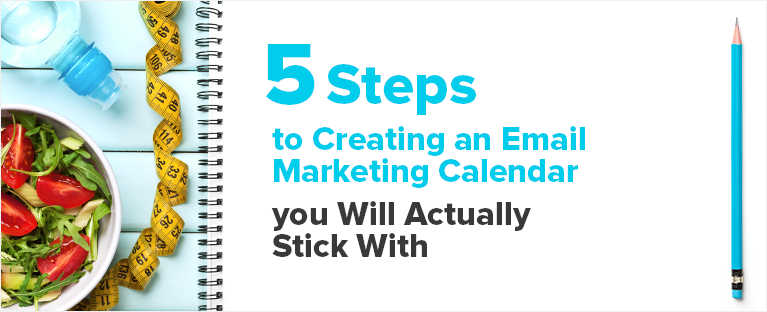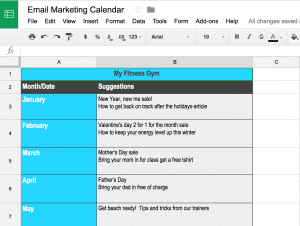January, the time for New Year’s resolutions! The time for diets, exercise and setting all kinds of new goals. What better time to create an email marketing calendar to plan out your year. Start fresh and find what works for you. The most important thing, like any New Year’s resolution is to stay consistent.
We all know that getting organized and starting something new is not the easiest thing to do, specially during the drab winter months. But I can assure you that once you’ve planned out your calendar, the rest will be smooth as butter. I’m not talking about creating a detailed day to day calendar, I’m just talking about having an outline that can easily be broken down month to month.
Email marketing is not just a game of numbers, it’s also about sending quality content. Content that will engage your existing clients, turn leads into clients and peak the interest of past clients. Below is a step by step guide to help you decide who, when and what to send. Sure you can throw stuff against the wall and hope it will stick, but why not spend a little more time planning so that you can eventually save time, and produce better results.
Step 1: Ask yourself what your clients want to read
You know your clients better than anyone, which means you know the tone you should be using. Whether it should be serious and factual or light and fun. You should always keep a good balance, between the tones. Of course it all depends on what’s happening in your industry, where you stand in comparison to your competition and your clientele. If you have a hard time getting inspired just think about how hard you’ve had to work to get to this point. How at some point all your accomplishments were all just a dream. That dream eventually turned into actions and those actions eventually turned into where you are today. Let those experiences ignite you, and let them transcend into the content you create.
If you’re active on social media, another trick is using your social highlights to inspire email content. Did a client praise you on Facebook? Did a client ask a question that might be pertinent to share? Let your content speak louder than the rest of your competition!
Step 2: Choose your audience
This part is crucial to the process because you won’t be sending the same content to all of your contacts at the same time. You have to associate the contacts with what your goals are. Use your customer data to organize different email lists and send offers that are valuable to that specific group. For example, you don’t want to be sending welcome emails to someone who is already a client. The loyal client will be more inclined to opening your emails if they contain something that will pique their interest. For instance, if your business is related to fitness, you may want to send an email containing a recipe of the week.
Step 3: Decide what to send
In general since you’re a business owner, you are sort of an expert in your field. You have access to all the best information. Why not use that information, and make it accessible for your clients. Keep it simple and straight to the point. Say something of value, be genuine to keep your clients inspired and thirsty for more.
Existing clients:
With existing customers your goal is to keep them engaged and show them why they need you. Below are some examples:
- Monthly newsletters informing them of new products, events, promotions
- Blog articles that can be written in house, or they be existing articles that you think your audience will find interesting
- Birthday and holiday cards
- Seasonal promotions
Potential clients:
With potential clients, your one and only goal is to convert them into paying customers. Naturally you would send them different content. This particular content can often be automated.
- Welcome email
- Intro emails
- Promotions exclusive to new clients
Past clients:
Past clients may not be doing business with you now, but they have in the past. Sometimes people just need a little reminder. You need to stay in the background and keep the relationship alive because you never know what will trigger them to want to do business with you again. Give them an offer they can’t refuse!
- Content driven newsletters with tips and tricks
- Offer incentives for being a loyal customer
Step 4: Decide on email frequency
Keep in mind that you are trying to maintain contact with your clients, so you want to send emails regularly. The key is not to flood your clients’ or potential clients’ inboxes with too much information. That will eventually lead them to unsubscribing to your emails. We’ve all been there and felt relieved immediately after clicking that unsubscribe button. Put yourself in the client’s shoes, and use your judgment.
Step 5: Track your efforts
It’s important to track what piques the most interest and adjust your style or content along the way You’ll have to play the scientist and be flexible without losing your email calendar momentum.
Now that you are ready to create your calendar. Below is a downloadable calendar template to make your life easier:
Click here or on the image below to use the template as a worksheet:
We’d love to know what inspires you to create the best content! Please comment.

